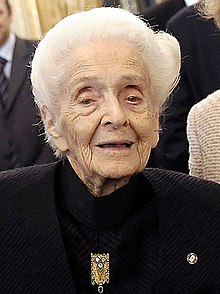Rita Levi-Montalcini
Italian neurologist (1909-2012)
Rita Levi-Montalcini (22 April 1909 – 30 December 2012) was an Italian neurologist and politician who, together with colleague Stanley Cohen, received the 1986 Nobel Prize in Physiology or Medicine.

| This scientist article is a stub. You can help out with Wikiquote by expanding it! |
| This woman article is a stub. You can help out with Wikiquote by expanding it! |
Quotes
edit- I have lost a bit of my sight, much of my hearing. At conferences, I can't see the presentations and can't hear well. But I think more now than when I when I was twenty. The body can do whatever it likes. I am not the body: I am the mind.[1][2][3]
- Man is ruined by servility, conformism, obsequiousness, rather than aggressiveness, which is much more common in the environment than within ourselves.[4]
- In life one should never give in, surrender oneself to mediocrity, but rather move out of that grey area where everything is habit and passive resignation. One has to grow the courage to rebel.[5]
- I never had any hesitation or regrets in this sense. My life has been enriched by excellent human relations, work and interests. I have never felt lonely.
- Of the fact that she never married; quoted in Associated Press obituary.
- Rare are those people who use the mind, few use the heart and really unique are those who use both.[5]
- Everything came easy to me in life. I could always shake off difficulties, like water on a duck's wings.[1]
- Those who are lucky enough to have faith are granted with a great support in all stages of life. If instead of an anthropomorphous God, who rewards the good, one replaces the imperative chiselled in our genetic program that good deeds have a price in themselves, and that evil has its own punishment, both the non-believer and the believer will find the same answer.[8]
- Better to add life to your days than days to your life.[5]
- I consider imperfection a Darwinian spring of natural selection. For example, present day insects are identical to those of six million years ago: they were already perfect, and there was no reason for them to change. Man was instead imperfect, and this was the proxy for his own development and evolution.[7]
- The young need to know how lucky they are to have been born in this splendid country, Italy.[9][2][3]
- It is imperfection — not perfection — that is the end result of the program written into that formidably complex engine that is the human brain, and of the influences exerted upon us by the environment and whoever takes care of us during the long years of our physical, psychological and intellectual development.
- Quoted in New York Times obituary
- After centuries of dormancy, young women can now look toward a future moulded by their own hands.
- Quoted in Obituary in The Guardian
- The allegations against Fidia cannot be true. The process for awarding Nobel prizes is so complex that it cannot be corrupted.
- Rebutting allegations that the pharmaceutical company Fidia had paid for her to get her Nobel prize. Quoted in Obituary in The Guardian
About
edit- She had this feeling for what was happening biologically. She was an intuitive observer, and she saw that something was making these nerve connections grow and was determined to find out what it was.
- Stanley Cohen, quoted in New York Times obituary
- She seemed able to face with equal equanimity the rigours of fascist cruelty and suppression that she was dealt as a Jew; the problems of practising underground medicine in wartime; the difficulties posed by prejudice and discrimination against women; and the near isolation and challenges of those working at the cutting edge of science.
External links
edit- ↑ a b In an interview with Paolo Giordano, 100 anni di futuro, Wired, n. 1, marzo 2009.
- ↑ a b Cited by Elisabetta Intini, Addio alla signora della scienza, le sue frasi più belle, Focus.it, 31 dicembre 2012.
- ↑ a b Cited in Addio Rita Levi Montalcini, le frasi più belle di un genio gentile, VanityFair.it, 30 dicembre 2012.
- ↑ From the presentation Elogio dell'imperfezione (Garzanti, 1987), Liceo classico Massimo d'Azeglio, Torino; cited in Giovanni Berlinguer, Il leopardo in salotto, Editori Riuniti, 1990.
- ↑ a b c [1].
- ↑ Cited in Addio a Rita Levi Montalcini, scienziata e donna straordinaria, Panorama.it, 30 dicembre 2012.
- ↑ a b Interview with Piergiorgio Odifreddi in Incontri con menti straordinarie (TEA, Milano, 2007), ISBN 978-88-502-1523-2.
- ↑ From an interview to a university journal Uniroma Network, anno 4, n. 7-8, pag. 3.
- ↑ Dall'intervista al TG1 Rai, in occasione del conferimento di una laurea honoris causa presso l'Università di Milano-Bicocca, 22 gennaio 2008.